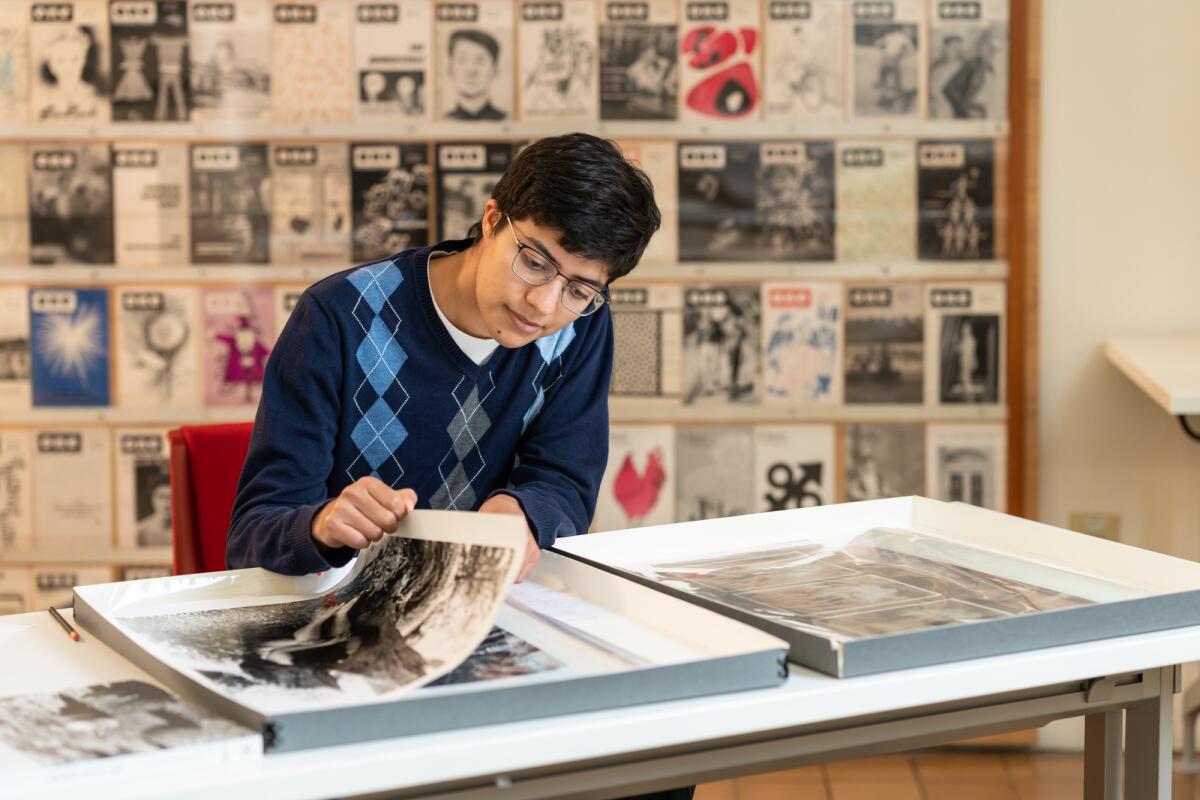Getty Foundation program aims to help emerging arts workers get a foot in the door

- Share via
The Getty Foundation has launched a new initiative, the Getty Marrow Emerging Professionals pilot program, dedicated to connecting historically under-represented groups with full-time, early-career positions at art museums and nonprofits in Los Angeles.
The two-year program connects the diverse cohort with mentors and networking opportunities to help jump-start their careers. Joan Weinstein, the director of the Getty Foundation, explains that the new program developed out of the need for diverse voices in the Los Angeles art world.
For the record:
11:03 a.m. July 12, 2022A previous version of this story misspelled Al Larriva-Latt’s name in the photo caption.
“Los Angeles is one of the most diverse cities in the world,” Weinstein says. “Yet staff at museums and visual arts organizations don’t reflect the racial and ethnic diversity of the city.”
In 2020, the foundation surveyed previous interns from their Getty Marrow undergraduate internships for an impact report. The institution collected data from some of their many interns since the program’s inception in 1993. Areas of improvement highlighted in the report included the need to provide African American interns with assistance post-internship; cultural competency training for supervisors; and mentoring opportunities with professionals of similar backgrounds.
Weinstein says the Getty Marrow Emerging Professionals program aims to address the issues brought up by previous interns.
“It remains an ongoing goal for us to help diversify the field,” she says. “We’ve been told by alumni of the program about the challenges they faced in finding full-time entry-level positions early in their careers, and many of them had to cobble together part-time jobs in that early career stage, and a few left the sector completely.”
To alleviate obstacles getting into the industry, Weinstein says that the participants will have a mentor within their assigned institution, a mentor outside their institution and outside peer-to-peer learning within the cohort to network and grow.
One of the mentors for the program experienced the same early-career struggles mentioned in the report. Sonja Wong Leaon, the director of registration and collections management at the Academy Museum of Motion Pictures, says that after she participated in the Getty Marrow internship in 2001, she had difficulty finding a full-time paid position in her industry.
“I’ve spent many years doing either unpaid internships or low-paid internships,” she says. “I hope that this provides a positive experience where someone can feel like they can breathe and also learn and feel secure.”
Leaon hopes to provide guidance and help young professionals by assisting in the program through the Academy Museum — one of the institutions taking part in the program.
Other Los Angeles institutions include the Armory Center for the Arts, the Autry Museum of the American West, the Benton Museum of Art at Pomona College, the Hammer Museum, the Museum of Contemporary Art (MOCA), ONE National Gay & Lesbian Archives at the USC Libraries, Self Help Graphics & Art, the Skirball Cultural Center, the Getty Museum and the Getty Research Institute.
Weinstein explains that since the new program is in its pilot phase for now, it will be accepting applications from their pool of intern alumni.
According to the foundation, the Emerging Professionals program is the first program in the nation functioning at this scale. Weinstein says there are programs that offer internships and fellowships, but not any that provide two years of employment with the goal of setting participants up for a solidified early career instead of “interns who pass through.”
“We are confident that with two to three years of professional experience and mentorship under their belts, these emerging professionals will be really well-positioned for career growth and new opportunities,” Weinstein says.
More to Read
The biggest entertainment stories
Get our big stories about Hollywood, film, television, music, arts, culture and more right in your inbox as soon as they publish.
You may occasionally receive promotional content from the Los Angeles Times.











